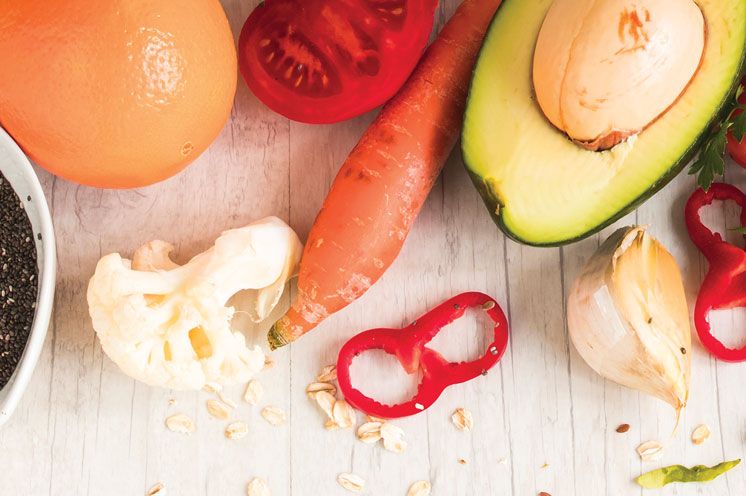From the inside out
Dietitian Paula Mee examines the relationship between the food we eat and the health of our skin, and offers some tips on how best to nourish the skin.
Dietitian Paula Mee examines the relationship between the food we eat and the health of our skin, and offers some tips on how best to nourish the skin.
From the inside out
Dietitian Paula Mee examines the relationship between the food we eat and the health of our skin, and offers some tips on how best to nourish the skin.


Paula Mee, Dietitian
Paula Mee is a current member and a past president of the Irish Nutrition and Dietetic Institute (INDI), the professional body for dietitians in Ireland. In 2004 she set up her own consultancy, providing a range of services in clinical nutrition, corporate wellness, marketing communications and new product development. She also lectures on the Masters in Applied Culinary Nutrition at Technological University Dublin.
A healthy diet over time influences fertility, promotes healthy pregnancy outcomes and supports normal growth, development, and ageing. It helps us maintain a healthy body weight, and reduces the risk of both physical and mental disease.
Nutrition can also have a significant impact on overall appearance, affecting skin, hair, and nails. How we eat has the potential to help reduce acne and other skin disorders; it can even prevent premature ageing and wrinkles. There's increasing interest in the study of beauty and nutrition, especially with the ageing population; people want to look and feel their best throughout their lifetime. Our skin health can impact our mental health and vice versa. For example, skin conditions such as acne are easily triggered or made worse by emotional stress.
Protection
The skin is the largest organ in the body. It protects us against environmental pollution and ultraviolet rays. It acts as a barrier preventing infections from dangerous microbes. Underneath the epidermis, deeper layers of skin are part of a huge vascular network that feed and keep tissues healthy, aid in wound healing, control blood pressure, and mediate immune reactions.
This close connection with the bloodstream means that the skin is usually one of the first places we can visibly see diet-related problems. Protein and calorie deficiencies manifest in skin lesions. Niacin deficiency (Pellagra) results in flaky skin and dermatitis. Other B vitamin deficiencies produce skin rashes and cracks in the corners of the mouth.
Nutrient insufficiencies
Although nutrient deficiencies are now uncommon, nutrient insufficiencies are not. And they can have a significant impact on the overall appearance of skin. Our skin must continuously renew itself. That requires a consistent supply of energy and nutrients.
A myriad of nutrients are necessary for skin health. Here are some key nutrients.
- Monounsaturated and polyunsaturated fats help your skin stay moist, firm, and flexible. Omega-3 fatty acids are a kind of polyunsaturated fat, which your body can't make. They are anti-inflammatory and help to build our cell membranes.
- Proteins provide 20 building blocks called amino acids. They help build collagen and keratin.
- Vitamin A prevents sun damage by interrupting the process that breaks down collagen. This antioxidant may give your skin some protection against sunburn (although this does not mean you can forget your sunscreen).
- Vitamin C is a powerful antioxidant, mopping up free radicals that can cause skin damage. Low levels of vitamin C can result in easy bruising, as well as slower-healing sores.
- Vitamin E, another antioxidant and anti-inflammatory agent, can absorb the energy from UV light, which damages skin and leads to wrinkles, sagging, and skin cancer.
- Zinc helps your skin heal after an injury. It's needed for cells to divide and specialize as they grow.
- Selenium acts with other antioxidants to protect your skin from UV rays. Selenium deficiency has been linked with a greater chance of skin cancer.
Nutrient insufficiencies
Although nutrient deficiencies are now uncommon, nutrient insufficiencies are not. And they can have a significant impact on the overall appearance of skin. Our skin must continuously renew itself. That requires a consistent supply of energy and nutrients.
A myriad of nutrients are necessary for skin health. Here are some key nutrients.
- Monounsaturated and polyunsaturated fats help your skin stay moist, firm, and flexible. Omega-3 fatty acids are a kind of polyunsaturated fat, which your body can't make. They are anti-inflammatory and help to build our cell membranes.
- Proteins provide 20 building blocks called amino acids. They help build collagen and keratin.
- Vitamin A prevents sun damage by interrupting the process that breaks down collagen. This antioxidant may give your skin some protection against sunburn (although this does not mean you can forget your sunscreen).
- Vitamin C is a powerful antioxidant, mopping up free radicals that can cause skin damage. Low levels of vitamin C can result in easy bruising, as well as slower-healing sores.
- Vitamin E, another antioxidant and anti-inflammatory agent, can absorb the energy from UV light, which damages skin and leads to wrinkles, sagging, and skin cancer.
- Zinc helps your skin heal after an injury. It's needed for cells to divide and specialize as they grow.
- Selenium acts with other antioxidants to protect your skin from UV rays. Selenium deficiency has been linked with a greater chance of skin cancer.

Paula Mee, Dietitian
Paula Mee is a current member and a past president of the Irish Nutrition and Dietetic Institute (INDI), the professional body for dietitians in Ireland. In 2004 she set up her own consultancy, providing a range of services in clinical nutrition, corporate wellness, marketing communications and new product development. She also lectures on the Masters in Applied Culinary Nutrition at Technological University Dublin.
Top skin foods
Certain foods can make a significant difference in your skin health – here are my top picks to add to your diet to improve skin health:
Olives and olive oil
The beneficial effects of olive oil are essentially due to these two components: the monounsaturated fat (oleic acid) and its antioxidant substances (e.g. vitamin E and phenolic compounds).
Use olive oil to enhance the flavour of a salad or in a marinade for seafood. Nibble on olives as an aperitif. Enjoy extra virgin olive oil with a squirt of balsamic vinegar for some sourdough bread dipping. The best grade is extra virgin olive oil, which is made from the first pressing of the olives. Extra virgin olive oil is much richer in antioxidants than lower grade oils, but you could vary its use at home with macadamia nut oil or avocado oil.
Oily fish
Salmon, mackerel and herring are healthy skin foods. The omega-3 fats they contain are necessary to help keep skin thick, supple and moisturised. Indeed, an omega-3 fatty acid deficiency can cause dry skin. The omega-3 fats in fish reduce inflammation, which can cause redness and acne. They can even make your skin less sensitive to the sun’s harmful UV rays. Oily fish is also a source of vitamin E, one of the most important antioxidants for your skin.
Eat at least one, if possible two, portions of oily fish every week. Avoid larger longer-living fish (shark, swordfish) with higher tissue contaminants such as mercury and PCBs and choose smaller, shorter-lived fish (anchovy, salmon, sardines) instead.
All fruit and veg, but especially the following;
Red grapes
Resveratrol, the famous antioxidant found in red grapes, may slow your skin’s ageing process by impairing harmful free radicals that damage your skin.
Leafy dark greens
Cabbage, kale, spinach, etc contain various amounts of antioxidants vitamins A, C, and E.
Broccoli
Broccoli is a good source of vitamins, minerals and carotenoids that are important for skin health. It also contains sulforaphane, which may protect your skin from sunburn.
Avocados
Avocados are high in monounsaturated healthy fats and they are also sources of vitamins E and C, which are important for healthy skin, keeping it flexible and moisturised.
Sweet potatoes
The beta carotene found in sweet potatoes can help keep your skin healthy by acting as a natural sunblock. It is provitamin A, which means it can be converted into vitamin A in your body.
Red or yellow bell peppers
Bell peppers contain plenty of beta carotene and vitamin C, both of which are important antioxidants for your skin. Vitamin C is also necessary to create collagen, the structural protein that keeps your skin strong.
Tomatoes
Tomatoes are a good source of vitamin C and all major carotenoids, especially lycopene. These carotenoids protect your skin from sun damage and may help prevent wrinkling.
Edamame beans and tofu
Soy contains isoflavones, which in some studies have helped improve wrinkles, collagen, skin elasticity, and skin dryness, as well as protect your skin from UV damage.
Walnuts
Walnuts are richer than most other nuts in omega-3 fats. They also contain small amounts of zinc, vitamin E, selenium and protein, all of which are nutrients your skin needs to stay healthy.
Green tea
The catechins found in green tea are powerful antioxidants that can protect your skin against sun damage and reduce redness, as well as improve its hydration, thickness, and elasticity.